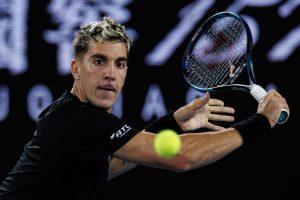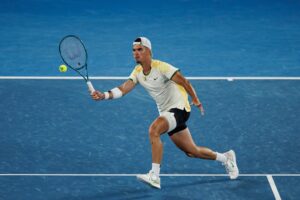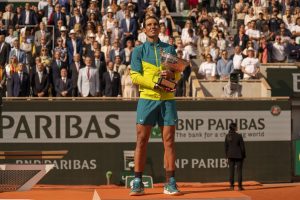It is literally early days, of course, for Roger Federer on the injury comeback trail. However, all the evidence from Qatar this week suggests that what most tennis writers and commentators had thought before his comeback began – namely, that he will struggle to achieve in 2021 what he achieved after his last big comeback in 2017, when he won three more Majors – is likely to be proved correct.
After more than a year without competing in any professional tournament whatsoever, Federer was always bound to be at least a little ring-rusty on his return. However, to extend the boxing analogy, he ended up going down to one of the journeymen who he would routinely have dismissed in the past. In the third round, Georgia’s Nikoloz Basilashvili eventually achieved what Britain’s Dan Evans had narrowly failed to achieve in his second-round match with Federer, by winning the match in three sets and securing a first win over the great Swiss.
The two matches that Federer played against Evans and Basilashvili were remarkably similar. In both matches, there was a very competitive first set, occasionally illuminated by the kind of brilliance that only Federer appears capable of, which the Swiss eventually won. Then, in the second set, Federer virtually collapsed against his opponent, as if the strain of playing a full set of tennis after a year off the tour had proved too much for him, and he lost both the second sets he played against Evans and Basilashvili.
Finally, although he was able to scrape through against Evans, he faltered against Basilashvili, despite having a matchpoint, and lost 7-5 in the third. Quite simply, the Federer who performed in Qatar this week was not, as his army of fans had hoped, the Federer of the 2017 Australian Open, when he stormed back after more than six months off with injury to win the Australian Open, his first Major in nearly five years and the first of the hat-trick of Majors that he would win over the next year.
Instead, it was the Federer of Melbourne in 2020, when he somehow reached the Australian Open semifinal against Novak Djokovic but was ultimately unable to resist the world #1, as the passing of time and the escalation of injuries finally caught up with him. In Qatar this year as in Melbourne last, Federer looked tired, both physically and mentally, and his profuse sweating (Federer barely seemed to sweat at all for the first 15 years of his career) and suddenly sunken cheekbones bore testimony to the fact that he will be 40 this summer.
Of course the Qatar Open was only Federer’s first tournament, and only his first and second matches, after his long injury lay-off, which perhaps significantly was nearly twice as long as his first ever major injury lay-off in the second half of 2016. And when he returned in Melbourne in 2017, Federer enjoyed the luxury of regular rest days in between his matches at the Australian Open, whereas in Doha this week the relentless schedule of a regular tour event meant that he had to back up his performance against Evans less than 24 hours later against Basilashvili.
Ironically, therefore, it could be argued that Federer might have a better chance of going deep at a Grand Slam event than he has of winning a week-long Masters or 250 event like Qatar, when he has to keep performing every single day. But of course at the Majors, Federer would not only have to play five-set matches rather than three-setters but there is every chance that at some point or other he will run into one or both of his twin nemeses, Rafael Nadal and Djokovic.
Nadal is five years younger than Federer and Djokovic six, and that age gap has never looked bigger. Whereas Djokovic triumphed again in Australia at the start of the year and Nadal looked as if he would at least reach the final before Stefanos Tsitsipas came roaring back at him from two sets down to reach the semifinal in Melbourne, Federer, for probably the first time in his career, looks physically frailer and weaker than either of them. The chances of his being able to win three sets against either of them, even at his spiritual home of Wimbledon, increasingly look remote.
Of course, if anyone is capable of overturning the odds and somehow winning a 21st Major, or even a first Olympic singles title, this summer, it is Federer. He has proved that he is capable of sporting miracles before, especially in that late purple patch of his career from January 2017, when he won his fifth Australian Open title, to February 2018, when he returned to the world #1 ranking for the first time in five years by winning the Rotterdam title.
However, Rotterdam now looks far longer than three years ago for Federer. Indeed, it almost looks like a lifetime ago, or at least a significant chunk of his late career ago. Three years on from that final, astonishing ascent to the top of the world game, it looks increasingly unlikely, especially on the evidence of his first tournament back, that he will ever win another Major or challenge for the #1 ranking again.
Main photo:
Embed from Getty Images






